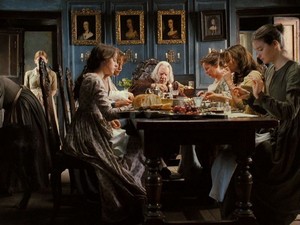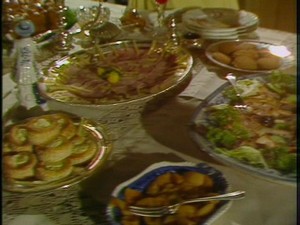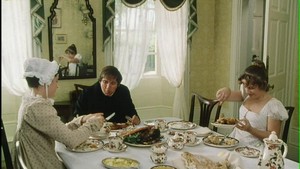
The following essay was just published in Such Things as Please My Own Appetite: Food and Drink in Jane Austen's Time, A JASNA-DC publication 2011

I always take care to provide such things as please my own appetite, which I consider the chief merit in housekeeping. I have had some ragout veal, and I mean to have some haricot mutton tomorrow . . .. . . in the meantime for Elegance & Ease & Luxury . . . I shall sit and eat ice & drink French wine, & be above Vulgar Economy (L, 11, 55, 121; 17-18 Nov 1798; 1 July 1808, 17-18 Oct 1815)
Upon opening and reading most editions of Jane Austen's letters, it does not take long before the reader lights upon passages like this: “Caroline, Anna & I have just been devouring some cold Souse, & it would difficult to say which enjoyed it most” (L 2, 14-15 Jan 1796). In a rare idyllic moment in Sense and Sensibility, Austen stirs warm affection for the painfully tactless Mrs Jennings by having her confide in Elinor “Delaford is a nice place . . . full of comforts and conveniences; quite shut in with great garden walls that are covered with the best fruit trees in the country; and such a mulberry tree in one corner! Lord! How Charlotte and I did stuff the only time we were there . . . (S&S, 2:8, 196-97).
The two famous drawings of Austen by her sister reveal a woman with rounded arms, full upper and lower body, if I may be allowed the expression, well-fed. Jane Austen liked to eat and drink (mostly tea); she was comfortable in and with her body size. When young, she enjoyed dressing up, such that readers of her letters have complained how she goes on about it, though she wished “such things were to be bought ready made” (L 15, 24-26 Dec 1798; Bryde; Juhasz). In her later years, she dressed down and as older than manners required, to the point that relatives commented uncomfortably, but no matter, she found “many Douceurs in being a sort of Chaperon for I am put on the Sofa near the Fire & can drink as much wine as I like” (L 96, 6-7 Nov 1813).
This is not a portrait – and it is accurate -- that many women today nor perhaps in Austen's era would be eager to have sketched of them.
Austen's admired heroines while not showily abstemious or eager in self-sacrifice, do not eat or drink with such enthusiasm (Lane xiii; Wooden). To be intensely relieved from anxiety or stress by tea or other refreshments is allowed, but then the fiction also usually works either to criticize indifference in one character or exemplify thoughtful consideration in another: after Fanny Price's long exhausting journey from Mansfield, when her sister, Susan, engineers tea for her, we are told: her “spirit was as much refreshed as her body, her head and heart were soon the better for such well-timed kindness” (MP 3:7, 384).
Austen implicitly criticizes Mrs Bennet for strained snobbery when she ostentatiously denies that she or her daughters have anything to do with the actual preparation of food (Lane 107-8), but (by contrast) while Mrs Grant's strenuous housekeeping efforts with her cook and gardener to avoid hours of misery lest they not please Dr Grant's exacting stomach derive from a “cheerful” good nature that makes her valued, several incidents show us that Mary Crawford is right to insinuate that her “poor sister” has gained security (to coin one of Marianne Dashwood's phrase) on very hard terms (MP 1:5. 46; 11, 111; 18, 171). Austen's Lady Susan would not be wrong to see in the “popping off” of Dr Grant after “three great institutionary dinners in one week” (MP 1:3, 24; 3:17, 469) and Mrs Grant's taking up permanent residence with her sister a happy ending for a good character (Lady Susan, MW 298).
Jane Austen's world is that of other women and in most communities most women are inescapably involved with food, and frequently experience a fraught relationship with it. Women are asked to shop, cook, and prepare for daily family tables edible food. While they are no longer pressured into relying on a man to provide money to buy it, and some need not grow it, food remains at the center of women's lives, of caring for babies (as when a woman chooses to breast-feed), of hospitality and ritual. Men need not involve themselves in any of this, and in Austen's time not only does no male ever make the tea, “Men seem to have been considered quite incapable of making tea, no doubt because it was perilously close to cooking” (Wilson 76). At the same time, women are pressured to be attractive, which meant and means to be thin and ever young in body appearance. The contradictions that arise are today reinforced by our public media, and have resulted in the increase of serious eating disorders among women (Bynum 277-302; Mantel).
One value of Austen's letters is they enable us to confirm a reading of the novels which expose the tyrannies of food, bodily appearance and housekeeping. Despite the novels' reticence, adherence to eighteenth-century class-based graceful decorum, and Austen's self-censorship as a unmarried dependent woman author, they are ironic on behalf of women.
I've room to point to just a few of the interconnected skeins of frank thoughts in Austen's letters dramatized in the novels. Her niece, Caroline, tells us that her Aunt Jane's “part of the household work” was “to make breakfast . . . The tea and sugar stores were under her charge – and the wine – Aunt Cassandra did the rest” (Caroline Austen 171), thus at Chawton providing Jane with time to write the versions of the novels we now treasure. Nevertheless, beyond Jane's enjoyment of food and drink and occasional vignettes of her consumption of favorites with gusto, Austen's letters frequently register the trouble (time and work) housekeeping took all the women, including servants (Lane 52). When they left Steventon, for example, she thus regrets the loss of Nanny: “The washing would be the greatest evil“ (L 33, 25 Jan 1801). Jane from London to Cassandra who has Charles and his family with her at Chawton: “ah, the comfort of getting back into your own room . . . and then the Tea and Sugar!”; “The quietness of [this Drawing-room all to myself] does me good” (L 84, 20 May 1813): Jane craves space, quiet and food and tea at hand.
In the letters we are told particulars of farming (including pigs and poultry), given even small costs of items from cooking and serving utensils and furniture to paper and pencils, cloth, trimming, told of trips seeking inexpensive cloth, and once the family leave Steventon for Bath, she teasingly lists prices: “Meat is only 8d per pound, butter 2d & cheese 9 1/2.” But Cassandra must “carefully conceal” from Mrs Lloyd “the exhorbitant price of Fish; – a salmon has just been sold at 2s 9d pr pound the whole fish” lest it scare Mrs Lloyd away from Bath (L 35, 5-6 May 1801).
Hilarity over such difficulties with food functions as defense and “take-in” (see Mary Crawford, MP 1:5, 46). We're comfortable laughing at the “stinking fish of Southampton” and Miss Charlotte Luttrell who told that her sister's coming marriage “is broke off” because the groom “had fractured his Scull, and was pronounced by his Surgeon to be” near death, “'Good God! . . . you don't say so? Why what in the name of Heaven will become of all the Victuals?” Has she “laboured Night and Day,” roasted, broiled and stewed “Meat and Myself to no purpose?” She sets about planning who and how each will consume it all (“Love and Freindship,” “Lesley Castle,” MW 78, 113).
Austen leaves room for each reader to empathize or part company with this or that of her housekeepers idiosyncratically. So, we can or not feel for Miss Bates's contrivances or Patty's embarrassment before Mr Knightley's Mrs Hodges's crossness (E 2:9, 239), see ourselves in Mrs Price's “slow bustle” (MP, 3:8, 390-91), Anne Elliot's “wonder” and perhaps then Elizabeth Elliot's rationalized-away attack of vanity when they differently face the reality that their family can no longer accommodate as many guests for dinner in high style in the small space of a Bath flat (P, 2:3, 138; 2:10, 219). My favorite joke in Northanger Abbey is still Austen's doubled-edged mockery of Mrs Allen's astonishment when Mrs Allen reads of the kitchen arrangements in gothic households: “How they could get through it all”—”the dirty work of the house”—when it was to be “done by two pair of female hands at the utmost”! (NA, 2:8, 184).
Likewise, we are left variously to identify with the differing particulars of what or how her central genteel characters eat and drink, but when Jane Fairfax can't eat, Fanny Price grows thin, and Anne Elliot is actually “haggard” (P 1:1, 6), we are asked to be concerned over moral, social and psychological trauma made visible on their bodies and faces.
Austen is alert to the relationship of dress to women's bodies: in London in 1813 she remarks “stays are [no longer] made to force the Bosom up at all . . . that was a very unbecoming, unnatural fashion. I was really glad to hear they are not to be so much off the shoulder as they were” (L 87, 15-16, Sept), and in the novels and letters the particulars of society's permitted abuse of women's bodies is no laughing matter. When Frank Churchill publicly salivates over the texture of Jane Fairfax's skin (E, 3:18, 478) or when Mrs Bennet shows a startling obtuseness when prompted to comment on her daughter's coming married life: “I was sure [she] could not be so beautiful for nothing” (P&P 3:14, 348), we are to glimpse what risks shallow disregard for these women as real suffering individuals could bring. Frank plays upon Jane Fairfax's sensitive nature.
In the letters Jane Austen's discomfort and pity for the continual pregnancies that were the lot of sexually attractive and active women of her era is continually registered: “Anna [a second niece] has not a chance of escape; her husband called here the other day, & said she was pretty well but not equal to "so long a walk; she must come in her Donkey Carriage."--Poor Animal, she will be worn out before she is thirty.---I am very sorry for her.--Mrs Clement too is in that way again. I am quite tired of so many Children.--Mrs Benn has a 13th . . . (L, 155, 26 Mar 1817). It's in the unpublished letters that gratingly and with twisted ironies she records more frankly what marriage forces women to cope with: “Mrs Coulthard and Anne, late of Manydown, are both dead. We have not regaled Mary [Lloyd Austen, her nine months pregnant sister-in-law) with this news” (L, 11, 17-18 Nov 1798).
When in her letters Austen urges another niece, Fanny Austen Knight to “not be in a hurry” and wait until she meets someone who will “love you as ever [Mr Wildman, a suitor] did, & who will so completely attach you that you will feel you never really loved before” (L 153,13 Mar 1817), and her fictional heroine, Jane Bennet urges Elizabeth: “Oh Lizzy! Do any thing rather than marry without affection” (P&P 3:17, 373) an awareness of women's bodily vulnerability fuels the felt poignancy (Wiltshire passim).1 That Austen's novels swirl around the problem that her women must marry to have any independence and respect as well as control over their food, shelter or space is an old familiar story, but not that, unlike many publications over history and today, Austen's novels insist on the price of this subjection.
One more story. Who else but Charlotte Lucas? As we all know, Charlotte Lucas's decision to marry Mr Collins is one readers continually return to and discuss, usually asking whether she was justified in marrying without love, prudentially, and depending on the particular reader's yay or nay, predicting happiness or misery for her future. I suggest we pay attention to the angle Charlotte directs us to, that she does not want to marry at all, that she is not “romantic,” not a woman who expects happiness from marriage, for she is not the type to fall in love with a man (Castle passim). That's what all her endlessly-quoted words say, and repeatedly, e.g., “it is better to know as little as possible of the defects of the person with whom you are to pass your life.” She uses the unwritten rules of good manners to parry Elizabeth's objections, and our narrator is left to tell us that she chose to marry Mr Collins because he offered, was respectable and had enough to secure her “from want” (P&P 1:6, 23; 1:22, 122-23, 125). All husbands would be a trial to her; and she discovers this one is so socially awkward with people, it's easy to keep him away from her space most of the hours she is awake (Bottomer 39-48). That she foresees and pays a high price is seen in the intense eagerness with which she asks Elizabeth to visit her (“Promise me . . .”), her later control over her body, her very blushes, her “composure”, her “enjoyment” of her hours with Elizabeth, and her strained silence in bidding Elizabeth good-bye, where “evidently regretting that her visitors were to go, she did not seem to ask for compassion” (P&P 2:3, 146, 2:5, 157, 2:25, 216).
The pain of Charlotte Lucas's story is that she had to give up the one meaningful relationship of her life, with Elizabeth. We may remember that Mrs Bennet did not miss a chance to denigrate Miss Lucas's looks before Mr Collins's proposal, but Charlotte's “triumph” is pyrrhic (P&P 1:3, 13; 1:23, 130; 2:17, 228) I am glad we last see her having escaped Lady Catherine de Bourgh's wrath at Darcy's choice and are yet spared seeing her pregnant (P&P 3:18, 384).
It is not in Jane Austen that we find any unexamined insistent idea that women spend their lives housekeeping, making food or clothes and at the same time stay super-thin and dress youthfully to the end. In Jane Austen marriage is often an ambivalent refuge, and bringing up children a difficult burden or task, even with ample funds. Fanny Price's defense of her rejection of Henry Crawford is apposite here: “Let him have all the perfections in the world, I think it ought not to be set down as certain, that a man must be acceptable to every woman he may happen to like himself” (MP 3:4, 353). Every woman should have the right to choose with great care who she will unite with and have to serve bodily. And in that service, let her eat as healthily as that “picture of health,” Emma Woodhouse (E, 1:5, 39) and her creator apparently did. Mr Woodhouse may be right to urge us to hesitate before marrying, but we must not let him starve us.
Ellen Moody
George Mason University

1 I disagree with Ruth Perry, e.g., 217. She comes to such conclusions because she forgets Austen's letters.
